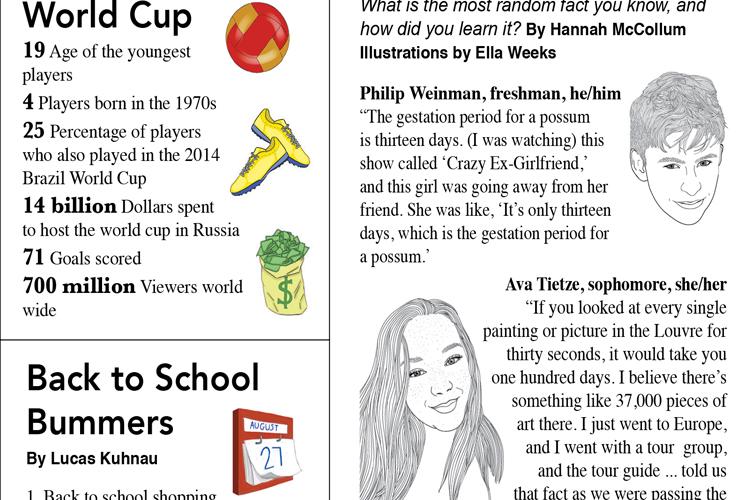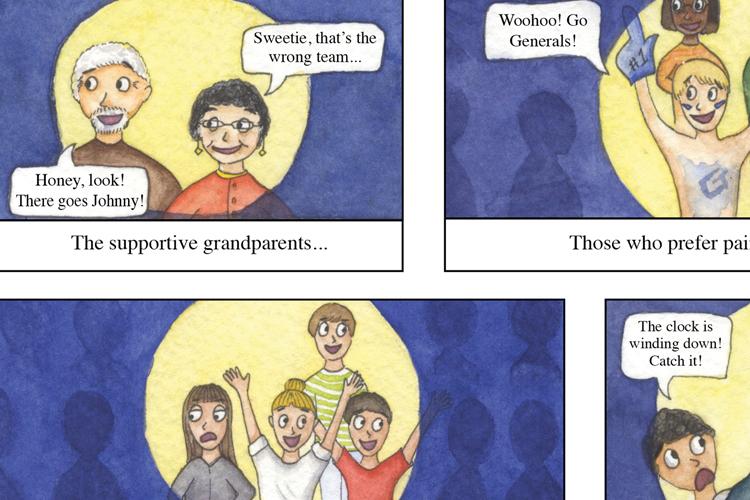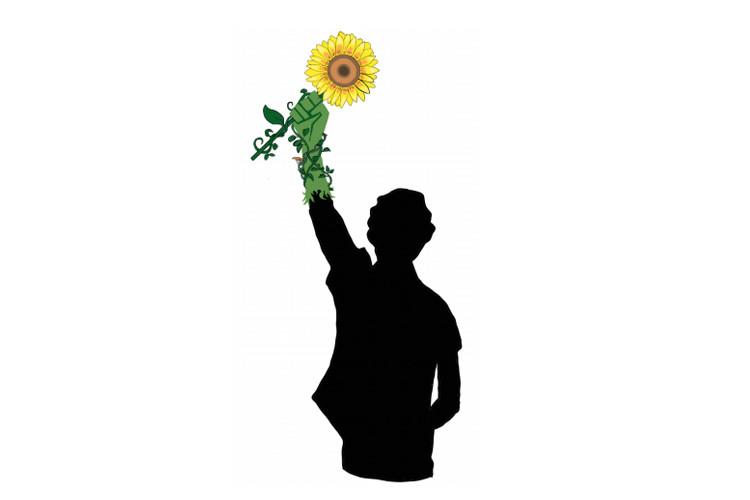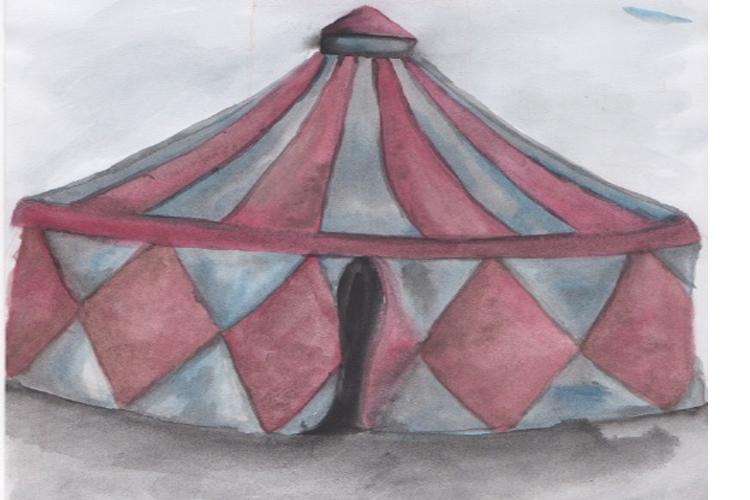“While almost all (91 percent) of LGBT teens are out to their close friends, fewer are out in school (61 percent) and to their families (56 percent). Respondents who were out at school and to their families reported higher levels of happiness than those who didn’t.” – Human Rights Campaign.
It’s lunchtime at Grant High School and then-sophomore Sam Allen is sitting with his usual group. They chat as they do every other day until a group of kids from Allen’s English class, most of them identifying as LGBTQ+, walks by. Allen hears one of the members in his friend group say, “All those people make me want to kill myself.”
For Allen, who had been struggling with vocalizing his sexuality to his friends, those words hit him like a truck. “(I was) sad. I didn’t want to say anything but I didn’t want to be there,” he says.
According to The Oregonian, the Portland Metropolitan Area has the second highest percent of LGBTQ+ residents of any metropolitan area in the nation. Despite this, homophobic comments like these still run rampant in the halls of Grant. “I hear lots of jokes, just like, using gay and dyke as an insult, that’s like everyday,” says Grant junior Violet Muhle Bruce, who identifies as LGBTQ+.
Without support in places like school, it can be difficult for students questioning their sexuality to find the confidence to come out in their home. In a 2018 survey, the Human Rights Campaign found that only 56 percent of LGBTQ+ identifying kids in the United States are out to their immediate family.
And although over 90 percent of LGBTQ+ identifying people say society has become more accepting of them in the past decade, many families still don’t accept their children after revealing their sexuality. According to the Pew Research Center, nearly 39 percent of LGBTQ+ adults were “rejected by family or friends because of their sexual orientation.”
Despite the obstacles and uncertainty, Coranna Akdemirbey, Carmen Saracco and Sam Allen all made the decision to come out to their families, wanting one thing: to be able to be themselves around the people they cared about. “Coming out is also accepting yourself,” says Akdermirbey.
While these stories all share a similar theme of positive outcomes, it is important to realize that everyone’s coming out experience is different and some aren’t as fortunate. Getting kicked out of their house or ending up disowned or homeless are all too common situations for many LGBTQ+ teenagers. In a study conducted by the Human Rights Campaign, LGBTQ+ young adults had a 120 percent higher risk of being homeless compared to youth who identified as heterosexual and cisgender.
People in the LGBTQ+ community are often associated with these statistics. For many in the community, the true extent of their identity often goes unnoticed. “You’re either ‘the gay kid,’ or everyone just sort of ignores that you’re gay,” says Allen. He stresses that it is important to take into account the other things that make him who he is. A person is not just their sexuality, or their gender, Allen says.
For LGBTQ+ kids, the significance of the coming out process is discovering more about yourself and becoming the person you truly are. “Coming out for me is being able to understand a piece of me that I was told to hide by society,” says Akdermirbey.
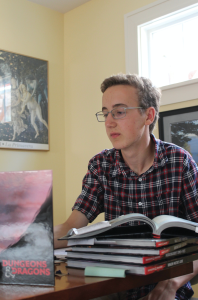
Sam Allen
He/him
As soon as the first lunch bell rings, Sam Allen finds himself sitting across the table from a fellow Role Playing Game (RPG) club member, staring at the board intently. It’s his sophomore year of high school, and he has finally found a place to call his own. The once quiet room increases in volume as people talk passionately about Dungeons and Dragons.
The RPG club is not one that is widely known at Grant, but it’s where Allen was able to branch out and find the group of friends he needed. “I’m definitely a nerd so like it was sort of a logical connection,” he explains.
Allen first joined the RPG club last year. “It’s a messy situation because I didn’t have many friends (at Grant) and definitely didn’t have many real friends,” Allen says.
Joining the club was the product of his personal confusion and lack of accepting peers to talk with. “When you haven’t come out yet, you don’t wanna stand up,” says Allen. “If you’re not really very close to a lot of the friends you don’t wanna alienate them by being the person who gets offended easily.”
Growing up, Allen always knew his parents were supportive. As much as he trusted they would accept and love him once they found out about his sexuality, the fear of his life changing after coming out lingered. It kept him focused on the negatives and made it more and more difficult to come out as time went on.
But in a spur of the moment decision in the spring of 2017, Allen decided to tell his parents. After making his signature de-stressing chocolate chip cookies, Allen had the perfect idea on how to break his news to the family. “They say you process your feelings better when they’re on paper but apparently when they’re in cookies they’re even easier,” says Allen. “(I) walked over and gave them to my mom and said, ‘Hi mom, I’m gay. I made cookies.’” The weight on his shoulders quickly lifted when his mom bursted out laughing.
Allen was relieved that his parents proved to be just as fine with the news as he thought they would be. Even with his fear of life changing after coming out, the need to be fully himself outweighed everything else. “It turned out okay,” he says. “We had like a long talk and she said pretty much all the right things. ‘You still have to treat boys like I told you you would have to treat girls,’ which was really important.”
But school was a different story. Dealing with the all too casual homophobic comments from his friends made it even more difficult to come out at school. Simple, seemingly harmless comments like “that’s gay” or, “bet you’d have to be gay to do that” kept Allen on edge and prevented him from coming out to the people around him.
The process of separating himself from his group of friends was surprisingly quick once he put his mind to it. He started to sit at the edge of the table and get quieter and quieter. The other kids seemed to forget he was there, so he left. “With my old group, it was just weird, I joined late, didn’t like what they liked,” says Allen. “I didn’t really want to be around them all that much nor did they want me there.”
With Allen not feeling secure in the group he was around at school, he knew it was not a great idea to bring up a topic like his sexuality. “Being around them was kind of like empty calories; it looked like I was getting what I needed but I could definitely feel that it wasn’t right,” he says.
After a while, Allen made the decision to permanently leave his old group of friends. He sat on his own for a few days, wandering the halls or reading a book in the corner. One day at lunch he saw a group of kids from his English class and started talking with them. Even though he did not end up being close with most of them, moments like this and joining the RPG were significant steps into Allen becoming the open, authentic person he always wanted to be.
As Allen has grown, so has his understanding of the situation many LGBTQ+ kids are put into: how difficult it is to find people that are accepting and that you click with. His experience has shown him just how important it is for people going through similar situations to hear stories of others they know, and people they can relate to. “It’s a really big deal for people to have understanding about (LGBTQ+) stories,” says Allen.“If you can hand that to the entire school instead of them having to look for it, there’s some power there for sure.”

Carmen Saracco
He/him
It’s the spring of 2017 and Carmen Saracco is touring with the Oregon Repertory Singers (ORS), a private choir group in Portland. Saracco laughs as he explains that the tour was a disaster. Kids mixed up solos so that certain parts of the song ended too soon, and some parts went on far too long. The bus scraped the top of an entrance arch. While Saracco admits that the tour did not go exactly as planned, the event strengthened his relationship with his team more than anything else. “(I’ve) made some incredible friends,” says Saracco. “It’s like a second home to me.”
Growing up, music was always a part of Saracco’s life, as all four of his grandparents were musicians. Saracco’s mom, Heather Brown, remembers him singing as soon as he could. “When Carmen was little there were days we only communicated in song. He wanted to sing everything we said to each other,” explains Brown.
When Saracco was five years old, he auditioned for the Oregon Repertory Singers (ORS), performing “Make ‘Em Laugh” from the musical “Singin’ in the Rain.” His mom remembers him performing in a sparkly dress and the whole event being very dramatic. “The assistant choir director was laughing so hard she had to hide behind a pillar,” says Brown.
When Saracco was born, his parents intended for Carmen to be his middle name. It was after Saracco’s grandfather, who Saracco was particularly close with. His grandfather was a music teacher who played a wide variety of instruments and sparked Saracco’s love for music.
Saracco and his grandfather were inseparable ever since Saracco was born. His mother recalls his grandfather never missing a choir concert and buying a “beautiful upright piano” for Saracco’s second birthday.
“Carmen was only eight when his grandpa died,” Brown recalls. “I recorded Carmen singing a song he wrote for his grandpa when he passed. It blew me away. The lyrics told their story and the melody was sweet and warm, just like his grandpa.”
Saracco’s grandfather sharing his love of music with Saracco is why he feels so connected to it; it is a part of who he is.
When Saracco was 12, he found out about the LGBTQ+ community. Since Saracco was unsure of his gender identity, it was helpful to know that there were others in the LGBTQ+ community who were experiencing similar things. Being in ORS, Saracco explains that it has always been a very supportive group for him that has helped him grow his confidence. To Saracco, it has been comforting “(Having) a group of people who I knew would be there for me.”
For Saracco, the choir was a safe place. He knew that no matter what, there were people in choir who accepted him and cared about him. “Our shared love of music gave me general confidence to be myself,” he says.
As important as his friends’ support was to him, his parents’ support was not any less so. He remembers them casually saying, “if you marry a boy or a girl,” and similar things about sexuality. It was because of their attitude towards the subject that he did not feel the need to make a big deal about being gay. “I didn’t come out at first sexuality-wise. I didn’t think it was something that people really needed to know about me and I didn’t care that much,” he says.
However, Saracco’s gender identity was a little bit more difficult for him, and the people around him, to digest.
At first, he came out as genderfluid, “Maybe I really was (genderfluid) because I was still fairly feminine at times,” he says. Saracco thought it might be easier for the people around him to understand, so he started coming out and asked to be referred to using gender-neutral pronouns. But he was still trying to figure things out.
When he finally came out as transgender, his mother especially was taken off guard. “We were just getting used to the ‘they’ and ‘them’ pronouns,” says Brown. “(But) I decided right away to accept his gender. I would certainly be annoyed if someone insisted I was a boy and referred to me using the wrong pronouns.”
And while he was still in the process of transitioning during freshman year, he changed his name to Carmen. “I’m not sure there was ever an official coming out. It was gradual, and still kind of is,” he says.

Coranna Akdemirbey
She/her
“I’m gay” were the words Coranna Akdemirbey screamed into her living room.
Just moments before Akdermirbey shouted those words, the Grant junior was sitting her father down in her living room. Everything was silent for a long time, then in a second everyone started talking at once, voices on top of voices, her father shouting his confusion to the group. “I don’t know why I did it,” Akdermirbey says of her outburst.
Those two words made the entire room silent once more, and her father began to cry. “He took a minute and then he looked at me and he’s like, ‘I’m disappointed, but you’re still my daughter and I’ll always love you,’” says Akdermirbey.
Not long before she came out, the idea of telling her father was unthinkable. As a Turkish-born Muslim, her father has strong opinions about homosexuality and often verbalized them to Akdermirbey. “Someone who’s a Muslim, raised in Turkey and surrounded by those Muslim norms – they don’t think (being LGBTQ+ is) natural or normal,” she says.
In the Qur’an — the sacred book of Islamic law — homosexuality is stated as a sin, and those who participated in it were often served harsh punishments like whipping, imprisonment and local banishment. In extreme cases, the death penalty was assigned.
For Akdermirbey, being around such a strong religious influence from a young age was damaging, especially while trying to figure out who she really is. When Akdermirbey was younger, she often tried to deny her sexuality. “I spent a solid few months, maybe even a year, just contemplating it like ‘this is wrong,’ cause I had been raised in that same mindset,” she says.
Prior to telling her father, Akdermirbey had faced her own struggles in self acceptance since she was young. It was not until the end of her freshman year that she felt comfortable with her pansexuality. But it wasn’t only her father’s religion that instructed her to deny her sexuality – it was also the lack of other open kids in her middle school. “I always felt a little bit different,” says Akdermirbey. Because of her lack of knowledge of different sexual orientations, as well as her young age, she didn’t understand why she was attracted to girls and boys at the same time, and since pansexuality is being attracted to someone regardless of gender identity or sexual orientation, this was extremely confusing. But after coming into high school, seeing the diverse sexualities and discovering the QSA, she realized, “Okay, so I’m not so different after all.”
Even with the thought of being disowned on her mind, Akdermirbey made a plan to tell her father. “I realized I was getting bitter because I couldn’t be myself,” she says.
Identifying as a pansexual is a huge part of who she is, and having to hide that from her father was unbearable. “(It) was killing me on the inside,” says Akdermirbey.
Akdermirbey’s negative feelings towards her father continued to escalate. Akdermirbey started to avoid his calls and dread the time they spent together.
After months of trying to avoid her father, Akdermirbey realized she was being unfair and had to tell her family.
After coming out to her family, Akdermirbey has grown into being herself, and her relationship with her father has grown as well. But they are both still learning how to communicate and spend time with each other. Akdermirbey feels that they have a better relationship now than they did prior to her coming out. “Our relationship is really good now,” she says. “I’m not bitter towards him, I’m willing to hangout and do fun things.”
“He – who had gone on rants on how gay is ‘sinful,’ how gay is ‘wrong’ – had said that he still loved me, and accepted me,” she says. “Our relationship is much better now, ‘cause I’m not hiding anything from him.”



























